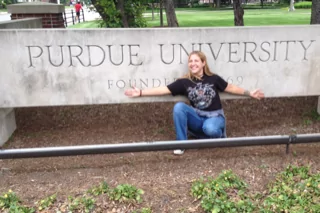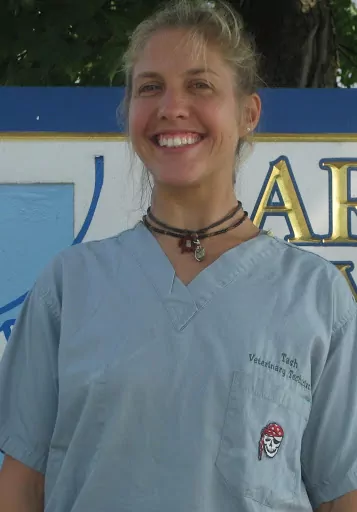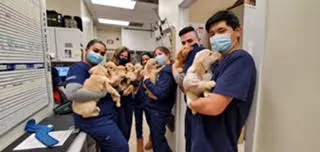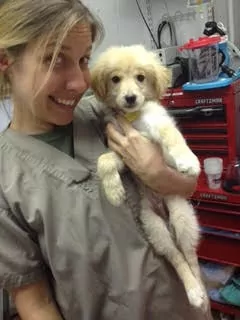Short info about yourself
My name is Natasha Feduik, I am 42 years old, and live and work on Long Island, NY. I have lived here for 17 years after relocating from my home of 25 years in Connecticut. I live with my long term partner of 20 years, Robert, and we have 2 precious dogs, Phoenix and Shiner, and an amazing cat named Whiskey, as well as two very vocal birds, King and Peeka.
What made you want to work with animals, and how did you start?
I have always bonded with animals, since before I can remember. We always had dogs growing up, a Siberian Husky, Border Collie, and Beagle, but never any cats since my mom was deathly allergic to them. But we did have the occasional hamster, ferret, and bird.
At the young age of 10 years old, my mother took me up to Tuft’s University to see the school. She and everyone else who knew me thought for sure I would pursue a career as a veterinarian, but I never wanted to be one. I always wanted to be a zookeeper because “I didn’t want to deal with the sick animals” (spoken by myself my entire childhood).
At the age of 16, I began volunteering at our local zoo in Bridgeport, CT, the Beardley Zoological Gardens. I helped create enrichments for the animals in captivity by making “toys” for them to keep them busy. I volunteered there for a couple of years until it was time to go away to college.

I had planned to go to Towson University in Maryland for a degree in zoology, but life had its way of interfering with my plans. This led to a few years of odd jobs and different career changes. At the age of 25, I moved to Long Island and answered an ad in the newspaper for a receptionist at an animal hospital.
I figured, if I was going to have an office job, it may as well be one that a dog walks by every now and again. Well, that was the beginning of the end. I ended up in the right place at the right time.
I met a group of mentors that believed in me and supported my future. I ended up going back to school at the age of 30, to get my degree in Veterinary Technology and my license. It was a slow process, but finally obtained my degree from Purdue University!
Where did you study to become a veterinary technician and CVPM, and how important and crucial do you believe schooling is for it?
Because I had to work full time, and because there are not a lot of options for schooling in Long Island for Veterinary Technology, I opted to do a distance learning program through Purdue University. This was an amazing experience, as not only did it allow me to work at my own pace, the program also provides its students with essential support. The program is designed to promote success!
After a year of practicing as a licensed veterinary technician, I starting looking into what came next. Anyone in this field knows that there is a reputation for technicians to become stagnant in the workplace after just a few years, and I wanted to explore what my options were for my future.
I know I didn’t want to leave the field, but I also knew I didn’t want to be doing the same tasks as I was for the next 30 years of my career. Specialty was always an option, but I wasn’t looking to leave my practice. I am dedicated and loyal to my hospital and wanted to help it grow as much as myself.
So I looked into the Certified Veterinary Practice Management program. I had the medical background that it takes to run a hospital’s functions, and had been put in leadership positions over time, as head receptionist and head technician. But I was lacking the business education that the program requires, so I enrolled in Penn Foster’s program.
With the knowledge provided and the amazing prep course available through the Veterinary Hospital Manager’s Association (VHMA), failure was not an option, and I passed the certification exam on the first try!

What does your daily day of being a CVPM include?
Survival, hahahahaha! I may be a little different than normal CVPM’s, especially having obtained my certification in the middle of a global pandemic. This industry has seen such an increase in the past year, with COVID. Our hospital is in an extreme growth period, so needless to say, I am not only the manager, but still, a technician, receptionist, assistant, and whatever other hat needs to be donned that day.
I would like to focus my efforts on growing our hospital, physically and financially, create jobs for people entering this industry, and develop people’s skills and futures, but sometimes I get stuck in surgery for 8 hours a day. It all comes with the territory, I guess. I am happy I have the medical background to be able to do all these tasks, and the business training to be able to do them efficiently.
What is the most important quality that you believe a LVT, and CVPM must possess to be successful?
Drive. I believe a strong work ethic and devotion are most important. It takes strength to be able to handle the high emotional state we work in, as well as the long hours and demanding workload. You need to want to be in it to win it. This is not a job you can just “go through the motions.”
You need to have heart, soul, and the determination to want to better yourself, those around you, and your hospital as a business each and every day.
What is your favorite part about managing a hospital, and what do you find most challenging?
My favorite part about managing a hospital is my team. The most challenging part about managing a hospital is my team. Hahahaha. I guess that’s why it’s also my favorite. It takes a lot of effort to manage people, but it can be so rewarding.
There is nothing better than watching people grow and succeed, learn new skills and even life skills, knowing you had a part in it, and that they will carry it on into their futures. But it’s also the hardest part of the job, because with people comes emotions, and conflict. But it’s by far the best part of the job. The business end of the hospital is easy.

What part of your job are you most passionate about?
First and foremost, I am most passionate about pets. That’s why we do what we do. That’s why we got into this in the first place. And providing amazing patient care is what it’s all about. But I am also passionate about the culture in my hospital. Culture is so important in our line of work, and can really make or break a hospital.
If your team is unhappy, your business will not succeed. You will have major conflict every day, it will be a struggle to get people to want to work, and you will have immense turnover. Culture needs to start with the top, by setting, displaying, and believing in core values, and these values need to be truly lived out throughout the days in the hospital.
Once the culture of the hospital is developed, the magic happens! Suddenly everyone is working well together, staff members look forward to coming to work, and want to give all that they can every day. It’s amazing to watch how powerful setting the right tone of the hospital can be.
What are your plans/goals for the future?
My goals for the future are to help other up and comers in our industry succeed. I want to help other technicians understand that there doesn’t need to be a 5 year term limit in our careers. And that specialty is not the only option out there. Veterinary medicine offers worldwide opportunities.
It does not end at the doors of our clinics. There are so many options out there to explore, whether it’s in clinical development, administration, or even pharmaceutical or academia. Many times, I have spoken to technicians who feel they will be stuck in the 10 X 10 white surgical suite that they have been in for years, and that they are living out a life sentence of lugging around 35 pound bags of dog food, and hoisting 80 pound dogs onto an exam table.
Clinical practice doesn’t need to be the end all be all if you don’t want it to be. I think this is why a lot of veterinary technicians end up leaving the industry, many of who move over to human medicine. That, and well, to be honest, the pay. But if these technicians know that there is more out there, that they can make a long term career out of it, and that the financial opportunity is also there, maybe they can stay in the field of their passion.
What do you like to do for fun/in your free time?
In my free time, I love to spend time with my family, travel, and surf. My family is an amazing support system for me, and I adore them and cherish any time I get to spend with them. I love to travel, as my mom was a travel agent when I was a child, and she brought me up to value exploring new places, meeting new people, and broadening my horizons by learning about other people’s cultures. It helps keep things in perspective. And surfing, well, it’s fun!

Do you have any advice for our readers?
The main point of advice I would tell anyone in this profession is don’t give up. I know, after being at practice for 17 years, how frustrating or exhausting it can be. I know I have gone home in tears countless times. I know I have mourned the loss of patients and colleagues.
And I know how tired you are because it’s endless. But remember why we do what we do. Remember the animals. Remember each other. Remember there’s a bigger picture than the walls of your clinic. And remember there are always people out there for support. Lastly, remember how rewarding our jobs are!
How well does it feel when that parvo puppy goes home after being in the hospital for days or weeks? How well does it feel when you help a young technician place an IV catheter for the first time? How well does it feel to walk out at night feeling accomplished and satisfied? I wouldn’t trade it in for anything.
